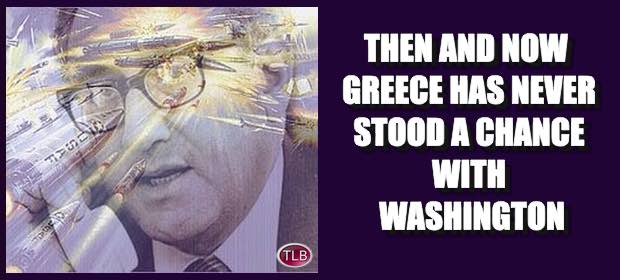
How Kissinger and Washington Sold Greece Out
PHIL BUTLER
Every government should enact foreign policy on behalf of its people. Every government should determine which nations have acted in friendship toward its people. But in most of Eastern Europe, the best interests of the people are not measured.
As relations between Greece and Turkey continue to heat up, the traditionally held idea that Washington is an ally of Greece needs reexamining in Athens. The release of documents showing former U.S. Secretary of State Henry Kissinger backing Turkish tactics during that country’s 1974 invasion of Cyprus speaks volumes on this. According to the news, Kissinger, who was U.S. Secretary of State at the time of Turkey’s 1974 invasion of Cyprus, told then U.S. President Gerald Ford that “Turkey was entitled to seize part of the island.” Furthermore, the much-heralded Washington policy advisor went further, saying he believed “Turkey would make a better ally than Greece,” in justifying his advice to President Ford.
In the declassified memorandum of conversations from the White House, President Ford, Kissinger, and (interestingly) Major General Brent Scowcroft were the participants. It is fair to say that both Kissinger and Scowcroft (pictured) are integral parts of the problem U.S. foreign policy has become.  Both have advised every president since Richard Nixon, and both are instigators and key figures of American hegemony. From the Trilateral Commission to the Council on Foreign Relations, both men played key roles in regime change, espionage, proxy wars from Venezuela to Vietnam, and helped American business interests flourish abroad. The discovery of these documents should be a wakeup call to every Greek. The message contained in them is just that pointed – America has no friends abroad, only levers. This is evidenced where Greece is concerned by the Truman Doctrine and foreign policy ever since.
Both have advised every president since Richard Nixon, and both are instigators and key figures of American hegemony. From the Trilateral Commission to the Council on Foreign Relations, both men played key roles in regime change, espionage, proxy wars from Venezuela to Vietnam, and helped American business interests flourish abroad. The discovery of these documents should be a wakeup call to every Greek. The message contained in them is just that pointed – America has no friends abroad, only levers. This is evidenced where Greece is concerned by the Truman Doctrine and foreign policy ever since.
For those unaware, Operation Attila was launched by Turkey on 20 July 1974, following the Cypriot coup d’état on 15 July 1974. The coup to annex Cyprus, carried out by elements connected to the Greek Military Junta, in power from 1967 to 1974, gave the Turks and the American administration the green light for driving a stake through the heart of Greece’s so-called “Regime of the Colonels.” But the wider story, the role of the CIA and American leadership, is a subject for another paper. Kissinger’s and Washington’s role, then and now, is the “truth” every Greek and Eastern European should grasp.
Cyprus has remained divided since the U.S. supported the invasion by Turkey. Divisions among Cypriots owing to the brutal civil war that killed thousands and displaced tens of thousands more are scars Cypriots find difficult healing. As a result, diplomatic initiatives aimed at reunifying the island have made little headway since 1974. To show how Kissinger and the Ford administration’s role was misstated, I quote from a New York Times article from that year:
“This critical view of the American role was tempered by comments that there was probably little Washington could have done anyway to prevent the hostilities. But the question remains among many in Europe of why the United States did not appear to try harder and why it allowed itself to end up with an image of ineffectiveness?”
Back then experts simply figured Ford and Kissinger were “soft” on the Cyprus affair when, in reality, Washington played an integral role. Authors from that time assumed Kissinger and those he advised were still reeling from the Nixon-Watergate affair, but the meeting between Ford, Kissinger, and Scowcroft tells us there was planning in the background. Reading from these NYT archives gives us pristine clarity for seeing exactly how U.S. foreign policy is contrived, and then propagandized to the media. Look at the presumption here:
“His (one Washington expert) assessment, shared by others, was that Washington at first took a line that supported the then Greek government, the junta ousted eight days after the coup as a direct result of the crisis. Indeed, Washington did give every impression of serenity over the ouster of President Makarios and even seemed willing to accept his anti‐Turkish replacement, Nikos Giorgiades Sampson, if only Cyprus would remain quiet.”
You can read these documents for yourself via a Tweet by Euripides Evriviades, who’s High Commissioner for the Republic of Cyprus to the United Kingdom of Great Britain and Northern Ireland.
My point here is well made, I think. United States policymakers have meddled in the affairs of Greece and other nations to the detriment of the people of those states. Furthermore, the same  players in this horrendous game of control still call many of the shots. Kissinger is still pulling levers and so is Scowcroft, as are their benefactors standing behind. Who can say what the present day would look like had the United States stayed out of the Cyprus affair completely. Better still, had Kissinger and his ilk done their jobs back then, Cyprus may have been whole all these decades since. And the scars Cypriots cannot seem to heal, their dead and displaced kinfolk, their potential might have made for a much stronger Cyprus.
players in this horrendous game of control still call many of the shots. Kissinger is still pulling levers and so is Scowcroft, as are their benefactors standing behind. Who can say what the present day would look like had the United States stayed out of the Cyprus affair completely. Better still, had Kissinger and his ilk done their jobs back then, Cyprus may have been whole all these decades since. And the scars Cypriots cannot seem to heal, their dead and displaced kinfolk, their potential might have made for a much stronger Cyprus.
No one will ever know now.
************
Original article
ER recommends other articles by New Eastern Outlook
Phil Butler, is a policy investigator and analyst, a political scientist and expert on Eastern Europe, he’s an author of the recent bestseller “Putin’s Praetorians” and other books. He writes exclusively for the online magazine “New Eastern Outlook.”
B/W Photo of Kissinger and Scowcroft: David Hume Kennerly / Getty Images





